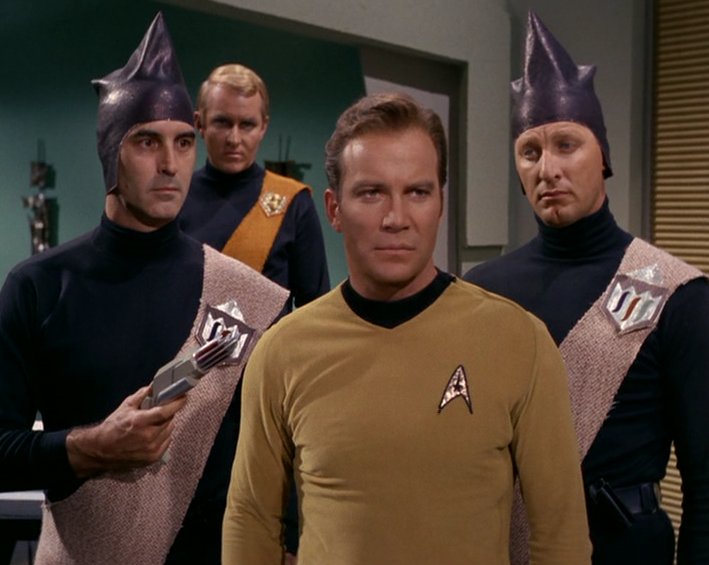By Joseph Young

After receiving generally positive feedback about poliscifi I thought I’d dip my toes in that water once again — it’s easy for me you see. My father is an avid Star Trek fan. He grew up with the old episodes, and when I was a kid we would watch The Next Generation and reruns of the original series together. Today, my kids watch shows like Dora and Blues Clues, but I was raised on Trek, the Hulk, Spider Man, and Star Wars (ever wonder why I’m so interested in violence?). One episode which my father and I watched several times together, “A Taste of Armageddon,” is some of the best poliscifi of all time.
This episode follows Star Trek’s main script: Captain Kirk and friends find a planet, encounter people that look a lot like us and are a threat to the crew and the Enterprise, and Kirk and friends (not the red guys, they always die) must find a cagey way out. It diverges a bit as I don’t recall Kirk being smooth with the ladies. Anyway, the critical details are these: the planet has had a long feud between two rival civilizations. Rather than continue to decimate each other in war, the two nations instead engage in a computer simulation. The simulation is a classic war game that allows a computational model to provide attacks and counterattacks and selects the individuals that “died” during the game. These individuals are then sent to disintegration chambers — the ultimate in sanitized conflict. This practice reduces the destruction of buildings and the environment, and created a stable equilibrium. What does this have to do with Kirk, Spock, and the good Doctor? They, of course, are selected for disintegration and have to convince the two parties of the madness of the whole endeavor.
Like many Star Trek episodes, this story is an allegory set in the shadow of the cold war. Regardless of Gene Rodenberry’s intent, “A Taste if Armageddon” provides some fodder for discussions of our current Drone War. Let’s assume that Peter Bergan is accurate, and the US has not killed a single civilian this year in Pakistan. Is this form of war moral? We can also assume Peter Bergan is mistaken, and then ask the same question. If we have operators/pilots managing a machine, killing alleged militants in Afghanistan in the morning and in Yemen after lunch, how different is this than the game from Star Trek? Sure, it may be a bit more one-sided, but the remote killing of the drone war has the same sanitized feeling. Not surprisingly, some observers chafed when news broke that the Pentagon is considering awarding Medals of Valor for drone operators/pilots.
Returning to the Enterprise, Captain Kirk gives an impassioned speech to one of the leaders of the warring nations in an attempt to end the war game:
“Death, destruction, disease, horror…that’s what war is all about…that’s what makes it a thing to be avoided. You’ve made it so neat and painless you’ve had no reason to stop it…we can admit we’re barbarians but we’re not going to kill today.”
The current debate over drones is often couched in utilitarian terms and arguments that US forces “are killing fewer civilians by using this pinpoint technology.” By using this sanitized version of war, are we also potentially numbing our population to its horrible costs?






0 comments